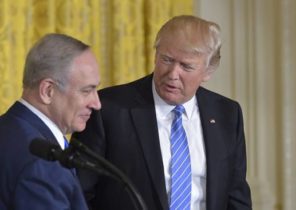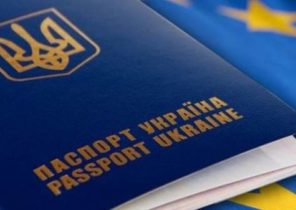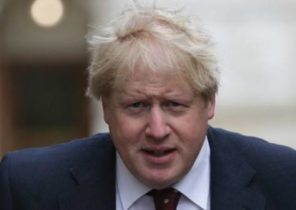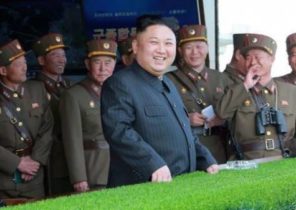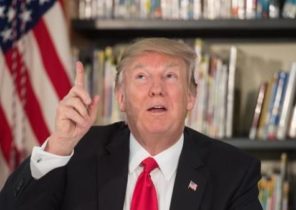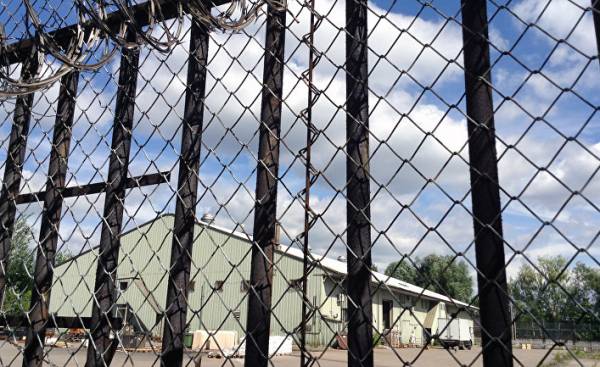
Vladimir Putin’s statement that he would require a sharp reduction in the number of employees of American diplomatic missions in Russia — not only as a personal message to Donald Trump, well, or a desperate attempt to achieve some reconciliation with the President of the United States — they promised — and a sign of how, despite previous expectations of Moscow, Putin and his entourage are preparing to embark in a more familiar, aggressive stance against Washington. Thinking of the Kremlin, apparently, is that if the United States is so strongly endeavor to accuse him of all sins, let him start the cold war — but, in any case, mutual hostility turned to Putin’s state comfortable and even familiar condition.
In an interview with state television, Putin expressed concern about the continued U.S. attempts to punish or in any other way to put pressure on Russia, and recently — passed congressional vote on the issue of consolidation in the legislation of the sanctions period of the Obama presidency, the purpose of which is the complication of the process of lifting them trump. Putin has shown that his patience is running out. “We’ve been expecting, maybe something will change for the better, had such a hope that the situation will change, he said. — But, apparently, if it changed, it’s not soon.” And said in turn that Russia will manage to reduce the number of employees of diplomatic missions of the USA in the country of 755 people — that is, more than 60% of the current level.
In U.S.-Russian diplomatic relations so sharp attacks not seen since 1986, when at sunset the cold war, the Soviet Union responded to the expulsion of 55 diplomats from the United States ban all Soviet citizens working at the American Embassy in Moscow. And that, in fact, represent those who send today? Most of them are, in fact, Russians. According to the report, posted to the blog Diplopundit, as of 2013 at the Embassy and three consulates of the USA in Russia worked about twelve hundred people. (These figures were relatively stable over the last four years.) About three hundred of them were direct-hire staff U.S. —members of the diplomatic service of the state Department and other US agencies, since the FBI and ending with NASA. The rest — more than 930 people — were local experts. Unlike, for example, the Russian Embassy in Washington which practically does not hire Americans, the American embassies and consulates around the world typically rely on a large force of local employees to perform administrative and technical work.
The main part of the demanded Putin cuts will hit exactly under this category, namely, Russian citizens, involved in the maintenance of the fleet of the U.S. Embassy, as clerks of the visa and consular offices, postmen, couriers, plumbers and chefs at the cafeterias. They will not be forced to leave the country, as those 755 American diplomats and other public servants, which the state Department sent home, but they lose their jobs, which will significantly slow down the activities of American diplomatic missions in Russia. Putin understands this, and therefore called the reductions “sensitive”: not only as a symbol, but a real barrier to maintaining relationships on the same level.
Ordered to make the cuts, Putin has approved the recent proposal of the Russian foreign Ministry, urged the United States to bring the number of its Embassy and consulates in Russia “in precise correspondence with the number of Russian diplomats and technical staff who are in the United States” — that is, to reduce by 455 people. In a statement the Ministry of foreign Affairs lists all the issues of bilateral cooperation, from counter-terrorism to non-proliferation, and at the same time complaining about how “the United States under absolutely far-fetched pretext of Russian interference in their internal Affairs persist, one after another rough anti-Russian actions”. “Despite the constant attacks from Washington, we were and behave responsibly and with restraint — continues in the statement. — However, recent developments indicate that in certain circles of the United States entrenched Russophobia and the policy of open confrontation with our country.”
Used in the communiqué of the Ministry of foreign Affairs the wording “known circles” and selected Putin to make a statement the moment give reason to believe that the Kremlin is, quite possibly, still hopes “to separate the” trump of Congress and the entire political elite of Washington. To the Kremlin that these forces do not give the President to seek better relations with Russia and to achieve tangible results, whether the easing of sanctions or cooperation in Syria. (In this question the results were dubious: in April, trump was ordered to launch a missile attack on government facilities, which greatly upset Moscow, and last week stopped the CIA’s program for arming the anti-Assad forces that have long appeared in the list of desires of the Kremlin.)
In recent months, Russian television reveals the same mysterious obsession with the ideas of the American “deep state” that among the most predisposed to the effects of the conspiracy theory supporters trump in the US: if not for an unfortunate anti-Russian and antithrombosis the elements that flavored the bureaucratic apparatus of the United States, trump could become what I believe in Russia and who he wants to be deep down. In mid-July, after the news about last year’s meeting between Donald trump Jr. and Russian counsel to the trump tower, Dmitry Kiselev, the most sour and morose propagandist of Russian television, talking about “the one campaign, Democrats and the liberal media”, and then gave a number of conspiracy theories allegedly affiliated with the National Committee of the democratic party and the Clinton family.
Putin has not completely abandoned the idea to improve relations with the United States. The purpose of his latest move was not a rupture of relations or refusal to work with trump, but on the contrary, the desire to warn him and provide an opportunity for appropriate steps. Tactics of sowing discord and benefit from the existing differences is one of the most consistent ideas of Russian foreign policy under Putin. For many years Moscow was trying to split the US and Europe, driving a wedge between Washington and Brussels on all possible issues, from sanctions to NATO and seeking to exacerbate divisions within the EU itself.
Putin now uses the same technique in relations with the administration of the tramp, trying to appeal to the latter as the identity and separate it from less inclined to appease Russia structures, whether of the Congress or intelligence agencies. As noted by the analyst of the Moscow Carnegie center Alexander Baunov, Putin announced his decision after a vote for new sanctions in Congress, but before the approval of the trump into law, and this means that his anger was aimed at the Congress. Perhaps Putin believes that now trump may refuse to sign the bill in its current form, citing inevitable damage to the diplomatic activities of the United States. In addition, Putin’s decree on the cuts will take effect in September, and he will have enough time to change or soften his position in that case, if the relationship with the trump will take a more hopeful turn. They can be the first step in negotiations, not a hard, unbreakable position.
Over time another peculiarity of the Russian reaction to the sanctions has become an element of “self-torture”. This is partly due to the large economic gap between Russia and the West: the first imports many consumer goods, and exports only a small part, but its largest companies depend on Western banks and financial institutions. A trade war with the United States or Europe will be lost, so plainly the Bud. Russia responded, as a rule, asymmetrically, by turning the private market and citizens at the same time and weapons and victims: in 2013, it banned Americans from adopting Russian orphans, and in 2014 imposed sanctions against the import of American and European food products, which has led to an increase in retail prices for food and became a great impetus for domestic agriculture.
Now, if Putin’s decree on diplomatic cuts will take effect, will suffer most probably the Russians themselves, because as job losses and difficulties with a visit to the United States, and missions in particular. Former U.S. Ambassador to Russia Michael McFaul predicted that the reduction of local consular staff will turn to the Russians a week, if not month waiting list for admission. This is another, less obvious goal of the Russian counter-sanctions: to force Russian citizens to feel punished and rejected in the context of a new cold war, even if these measures initiated by Russia itself. This nuance can easily be hushed up on national television, not to mention using it as a Patriotic slogan of the campaign for Putin’s re-election for a new term next year, which otherwise will have to find a new consistent and effective ideological content. Moscow, like Washington, there are many reasons to support the continuing default icy and aggressive tone, and no plans of Putin and the trump may not have the power to change it.



